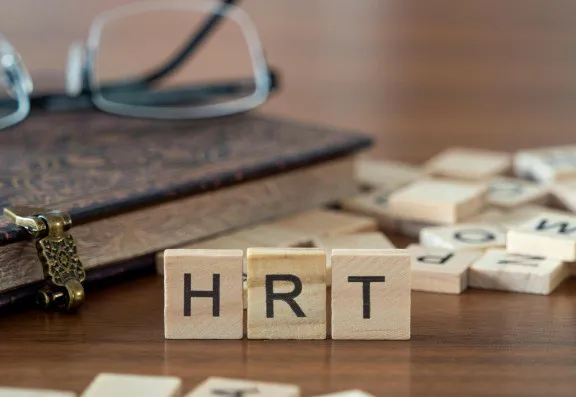Hormone replacement therapy (HRT) is well-known as the main treatment method for managing menopausal symptoms. It helps to regulate your hormones, which will ease many of the symptoms associated with menopause.
Over the years, there’s been lots of debate on the pros and cons of HRT – with many women hesitant to take it. Here we outline the key details.
Of course, bear in mind that this is not medical advice – before starting any medication you should have a detailed consultation with your GP who will assess your suitability for taking HRT and share all the information you need to help you make an informed decision.
The menopause is something that all women will experience. It occurs when women’s periods stop due to lower hormone levels; the ovaries will stop producing as much of the oestrogen hormone and no longer release an egg each month. Perimenopause is the time leading up to this event; women will often experience irregular periods and other symptoms associated with a decline in their hormones. These can include:
Many women find these symptoms have a big impact on their overall quality of life, which is why they seek treatment with HRT.
HRT is a treatment to help relieve the symptoms of perimenopause/menopause. It can be prescribed by your GP after a consultation.
HRT replaces your body’s levels of oestrogen and/or progesterone to ease symptoms. It can also help reduce the risk of osteoporosis and heart disease.
Oestrogen can come as:
Progesterone is taken to protect the womb lining from the effects of oestrogen. It can come as:
Women can also take testosterone to improve their sex drive.
Taking HRT can greatly ease symptoms associated with menopause. You should see an improvement in:
HRT can also help reduce thinning of bones, which can lead to osteoporosis.

As with most medicines, there are side effects associated with taking HRT.
If you take oestrogen, you may experience:
The NHS highlights that these often pass after a few weeks, but you can contact your GP to switch how you take your oestrogen which can help.

Taking progestogen may lead to:
Again, you can speak to your GP about switching to a different dose or form if side effects persist after a few weeks.
If you’re suffering from severe side effects or they last longer than three months, then it is advisable to speak to our GP for their support.
The NHS outlines that there are risks associated with taking HRT, but clinical research has found them to be very minimal. It says the benefits usually outweigh the risks.
Combined HRT can be associated with a small increase in the risk of breast cancer, while there is little or no change in the risk if you take oestrogen-only HRT, according to the NHS.
The increased risk relates to how long you take HRT, and it falls after you stop taking it.
Ensure you attend all of your breast cancer screenings if you’re taking HRT.
The NHS says that there is a small risk of blood clots if you take HRT tablets, while there’s no risk if you use HRT patches or gels.
There’s no evidence to suggest that taking HRT significantly increases your risk of heart disease and strokes before the age of 60. That said, the NHS notes that HRT tablets are associated with a small increase in the risk of stroke but this is very small.
While HRT is the main clinical treatment available to help regulate your hormones and calm menopausal symptoms, there are alternative therapies you can try.
As always, if you have any questions you can use our Menopause Q&A where you can ask for more advice.
We have lots of Menopause FAQs, Menopause videos, Menopause reviews, and Menopause before and after images for you to do more research.
If you want to look for your nearest verified Menopause clinic, your local menopause clinics are listed below.